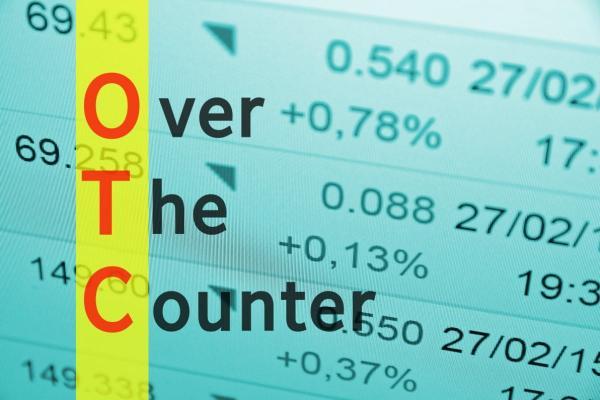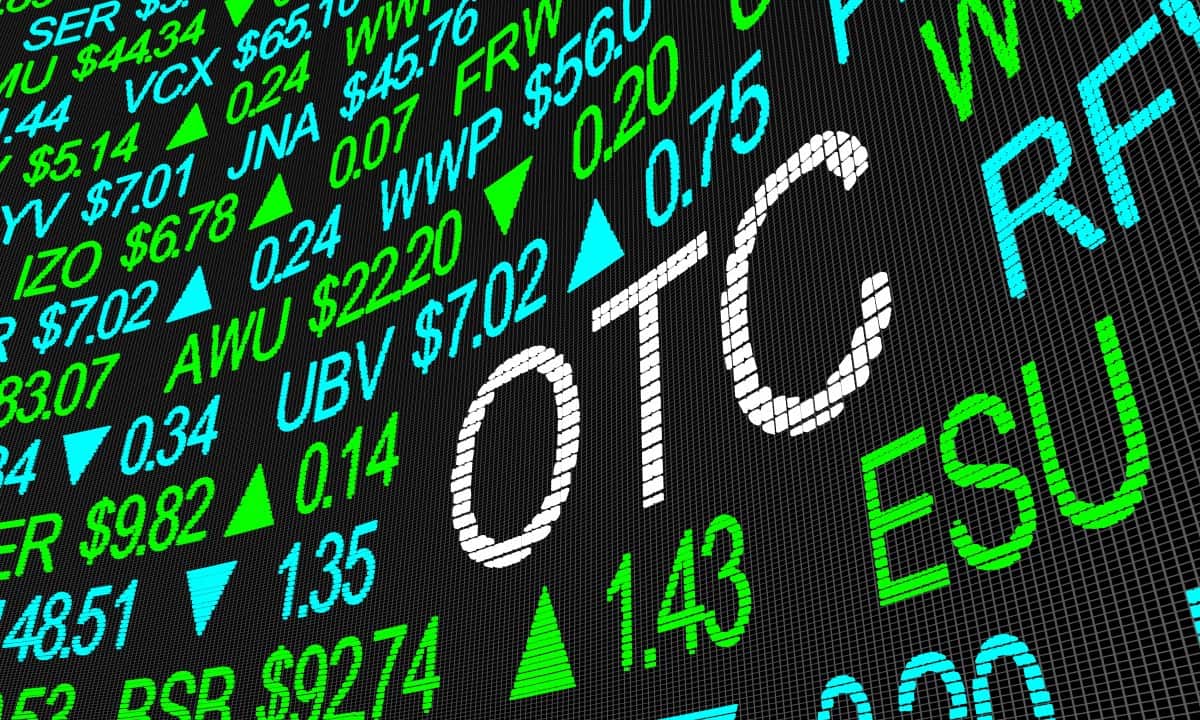

What Is the OTC Market?
OTC Markets: Definition
If you're familiar with trading or investing, you know that most operations are done via a third party, who's usually a broker. However, there is another system: the Over-The-Counter market, also known by its abbreviation OTC.
Generally speaking, OTC refers to trading that occurs between two market players without a broker or central exchange. It's a decentralised marketplace without a physical location, so all operations are executed electronically.
The OTC is a decentralised two-party marketplace without a physical location, so all operations are executed electronically.
The OTC market doesn't have common market makers. And although the OTC is associated with stocks, this market provides trading of all standard securities, such as currencies, stocks, commodities, bonds and derivatives.
However, this definition is not expansive enough and doesn't include the option for a broker to be a market participant, which can happen if an investor applies to a broker to represent their interests on the OTC marketplace.
How Do OTC Markets Work?
As you can see from the information above, there are only two parties involved in the OTC market, so you may wonder how the market works.
The process differs from an auction market system. On the OTC, dealers set prices at which they want to buy or sell assets, and prices are monitored through the Over-the-Counter Bulletin Board (OTCBB).
The process differs from an auction market system. On the OTC, dealers set prices at which they want to buy or sell assets.
Thus, they act as market makers. As a result, the third party doesn't know the cost of the transaction.
Usually, a broker is considered a third party. Still, if you want to operate on the OTC market, you better apply to a broker to represent your interests and be only a second party of the trade.
The markets are operated by the OTC Markets Group.
History
The Pink Sheets were the basis of the current OTC market. In 1904, the National Quotation Bureau (NQB) applied an inter-dealer quotation on pink papers. The NQB didn't improve the system to allow larger companies to enter the market, so only small, risky firms could participate in trading.
The OTC market is based on the Pink Sheets.
In 1997, the NQB was acquired by a new owner. In 2000, its name was changed to the Pink Sheets. Later, the Pink Sheets were renamed as the OTC markets. After that, electronic products and information services were developed, which improved the OTC market's transparency.
Because the Pink Sheets included different types of companies, the decision was taken to divide the firms into three tiers, so traders could understand how to distinguish companies.

Tiers of the Over-The-Counter Market
There are three tiers of the OTC market, which differ in their degree of regulation.
OTCQX
The OTCQX is the most reliable tier of the OTC Market Group. It allows trading of multinational corporations, blue-chip enterprises and all companies that can prove their reliability.
The OTCQX is the most reliable tier of the OTC Market Group.
The market has strict requirements. A third-party financial adviser must sponsor the listed enterprises, and the companies must adhere to US laws. As the OTCQX platform has high requirements, it helps to exclude penny stocks and protects investors from fraudulent firms.
Investors should be careful, though. Despite the higher degree of regulations, companies' stocks can still be low-quality.
Furthermore, although the market is strict, it's still decentralised and private, which allows the OTCQX to provide the right balance of being free and safe.
This marketplace includes such famous names as Nestle SA, Roche Holding AG and Bayer AG.
OTCQB
The OTCQB is also known as the Venture Market. This market is subject to a minimum set of requirements. The OTCQB is a platform for small, developing companies from the US and around the world. It includes companies that don't meet the requirements of the OTCQX.
If a company wants to be listed on the OTCQB, it must pass a $0.01 bid price test and provide an annual review to confirm its legitimacy. It must also pay a $12,000 tax per year and a one-time $2,500 application fee to enter the market.
Unlike the OTC Pink, there is a specific requirement for available information. Most firms report to the FDIC or SEC, although they can still go bankrupt. At the same time, the market doesn't have a standard amount for the company's finances. As a result, shell companies, penny stocks and small foreign firms can be listed on the market.
Fraudulent firms can be a challenge for investors on OTCQB.
Even though these requirements don't provide a high level of transparency, the OTCQB is less risky for investors than the OTC Pink.
OTC Pink
This tier has an interesting name that dates back to times when prices were distributed on pink papers. Previously, the entire OTC market was associated with pink sheet trading. However, the OTC Markets Group later reclassified the OTC and broke it into three tiers.
OTC Pink is the most speculative tier among the three. Companies don't need to file with the SEC to be listed on this market. Also, firms can provide as much information as they want. Thus, this marketplace can be considered unregulated.
OTC Pink is the most speculative tier among the three.
The companies are classified based on the critical feature of the Pink Open Market.
- Companies with current information. These enterprises comply with the International Reporting Standard or Alternative Reporting Standard. Companies' filings become public through the OTC Disclosure & News Service.
- Firms with limited information. This category may include companies with accounting issues and those going through bankruptcy and financial distress.
- Firms without information. These companies don't give any disclosures.
The only requirement is to receive quotes from a broker-dealer that must be registered with the Financial Industry Regulatory Authority.
If you choose this tier, be ready for a high degree of risk. Only experienced investors can successfully trade on the OTC Pink marketplace and avoid scams and frauds.
Pros and Cons of the OTC Market
The Over-The-Counter market has more disadvantages than advantages. Here's our list of them.
OTC Markets: Pros
- Fewer regulations. This is an advantage for companies, not for traders. If the company doesn't comply with world stock exchanges' high requirements, it can be listed on the OTC market.
- Privacy. This is an advantage for market parties as their transactions are decentralised and aren't controlled as they would be on traditional markets.
- Openness. The market can be considered more open than other regulated markets.
- High returns. High rewards finance high risks. It doesn't mean that an investor will become rich immediately. Still, the opportunity for higher income does exist.
- A wide range of traded instruments. The OTC markets allow bonds and derivatives not available on standard exchanges to be traded.
OTC Markets: Cons
- A lack of regulations. The OTC market is decentralised and less reliable than a typical marketplace.
- A lack of liquidity. As the OTC market is not the primary market, it can suffer little liquidity because there are not enough buyers and sellers.
- Unstable asset value. Due to the low liquidity, the price of the securities may suffer high volatility.
- Counterparty risk. Despite the standard market risks that the OTC experiences, there is another one called counterparty risk. As the OTC has weak regulation, there is a chance that parties won't complete a trade or won't make the required payments.
- Lack of transparency. This factor makes it impossible to monitor trades. It may lead to more significant problems such as worsening crisis conditions. In the 2007 crisis, the lack of liquidity resulted in the lack of mortgage-backed securities such asCDOs and CMOs and derivatives buyers.
- High risks. Due to the factors mentioned above, you can see the market is subject to high risk. Limited regulations and the possibility of fraudulent companies are the primary reasons.
- No barometer. When entering a common financial market, you know that the price is quite fair. It's based on supply and demand and regulated by a third party. On the OTC, fairness is questionable.

What Financial Instruments Can I Trade on OTC Markets?
Although the OTC market is mostly associated with stocks, you can trade different securities.
Commodities
Although the volume of commodity trading has been declining in recent years, traders and investors continue to operate these types of securities. The OTC market allows commodities to be traded, as well
Currencies
Many forex brokers provide their clients with OTC trading. In the case of the OTC market, a broker serves as one of the two parties.
Stocks
OTC stocks mostly relate to small companies that don't meet the requirements of stock exchanges. At the same time, not only small firms are listed on the OTC. Well-known names can also enter the OTC.
Debt
Bonds can be traded on the OTC market, too. If you're experienced enough in the bond market, you can try OTC debt trading.
Derivatives
Derivatives are mostly used to hedge risks. As the market allows a wide range of securities to be traded, it gives an option to adapt the contract specifications to the risk exposure.
OTC Markets vs Standard Exchanges
OTC markets and standard exchanges have significant differences. See the table below.
|
OTC Markets vs Standard Exchanges |
||
|
OTC Markets |
Standard Exchanges |
|
|
Market maker |
A dealer |
The exchange itself |
|
Contracts |
Customised (Parties agree on the price of the asset) |
Standardised |
|
Liquidity |
Low |
High |
|
Transparency |
Low |
High |
|
Risk |
High |
Low (Risk still exists, but it's lower) |
OTC or Standard Exchange?
Although the Over-The-Counter market allows investors to get a higher income, the high level of risk is the main pitfall you should consider.
Standard markets, such as forex and stock markets, are the best options. Trading is done via brokers and regulated by world organisations. They guarantee the security of trader funds and the execution of orders placed.
Conclusion
To conclude, the OTC markets are risky. They're recommended only for experienced traders or newbies who apply to brokers. The markets have many advantages, such as a vast number of financial instruments and privacy. At the same time, investors should be careful as the cons outweigh the pros.
That's why you should trade on standard exchanges if you don't feel confident. Libertex provides a wide range of assets for trading and guarantees the security of funds. For example, you can try CFDs that include stocks, metals and oil.
The OTC is not a simple market, which is why it's worth summarising the main points about OTC trading.
FAQ
What Is the OTC Market?
The Over-The-Counter or OTC market is a marketplace where operations are executed between two parties who serve as market makers.
Where Can I Buy OTC Stocks?
Although the Over-The-Counter is a platform for trading between two parties, OTC investments are available via full-service and discount brokers.
Is the OTC Market Safe?
The OTC market has a low degree of transparency and regulations, so it's not a safe platform, especially for newbies.
What Is the Difference Between the OTC and the NYSE?
NYSE is a centralised market that includes many market participants. The OTC is a broker-dealer network. The NYSE has high requirements and a significant level of regulations, while the OTC has weak regulations.
Can a Stock Go from the OTC to the NYSE?
Stocks can move from the OTC market to the NYSE if they meet the stock exchange's requirements.
Is It Hard to Sell OTC Stocks?
It can be challenging to sell OTC stocks due to limited liquidity, especially when it comes to the OTC Pink.
How Do I Know If a Stock Is OTC?
To find that out, you should open an account with a broker and check the list of securities available for OTC trading.
Can You Day Trade on the OTC?
Yes, it's possible to day trade on the OTC market.
When Does the OTC Market Open?
The OTC market is open Monday to Friday from 6:00 a.m. to 5:00 p.m. ET.
Disclaimer: The information in this article is not intended to be and does not constitute investment advice or any other form of advice or recommendation of any sort offered or endorsed by Libertex. Past performance does not guarantee future results.
Why trade with Libertex?
- Get access to a free demo account free of charge.
- Enjoy technical support from an operator 5 days a week, from 9 a.m. to 9 p.m. (Central European Standard Time).
- Use a multiplier of up to 1:30 (for retail clients).
- Operate on a platform for any device: Libertex and MetaTrader.